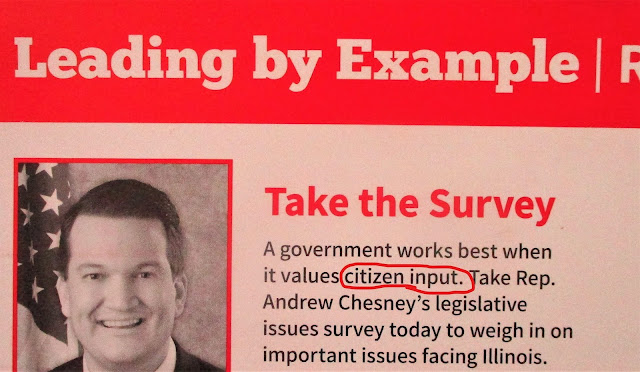Earlier this year the City of Freeport received certified notice that the city's population had fallen below 25,000, triggering an Illinois Statute which requires the municipal clerk to place a referendum on the next general election ballot asking residents if they wish to remain a home rule unit.
Suddenly, now that home rule is a ballot issue subject to a forthcoming referendum, the Freeport City Council wants to "talk" about the vast and liberal powers home rule bestows upon the Freeport City Council.
Despite the fact the Freeport City Council has been using home rule powers very liberally for the past 30-years, they've never wished to discuss how home rule was being used until it became a referendum issue. Tutty can only remember one time home rule was publicly discussed on the council floor in the past three decades. That time was during the Jim Gitz administration when he, as Mayor, vetoed the budget brought forth by the council because it contained a home rule sales tax increase. Mayor Gitz publicly proclaimed that he thought raising the sales tax without referendum approval was an improper use of home rule powers.
Now, suddenly the City Council is adamant amount discussing home rule authority, as a matter of fact, as part of the Strategic Plan being brought forward at the November 15, 2021 Council meeting using city resources for a "Home Rule Campaign" is part of the strategic plan.
What's more, according to approved meeting minutes from the City Council's strategic planning sessions on September 10 and 11, "Protecting and promoting Home Rule....is important."
And then there are all the public utterances recorded during council meetings citing the importance of retaining home rule powers.
The Freeport City Council, and perhaps more importantly, their high-paid legal counsel from Rockford, do not seem to realize that it's very likely unlawful for the Freeport City Council to take a stand on a referendum issue.
Did any member of the Freeport City Council or their attorney even consider these facts? Has the attorney being paid by public dollars even bothered to review Freeport ordinances regarding the subject? To Tutty, it appears not. Here's why.
Chapter 218 of the Codified Ordinances of the City of Freeport is meant to keep the Freeport City Council from using their official duties and our tax dollars to play politics and is vividly clear.
Chapter 218 defines "Prohibited political activity" as "Campaigning for any elective office or for or against any referendum question." as well as "Managing or working on a campaign for elective office or for or against any referendum question." Among many other things. Tutty would encourage, the Freeport City Council, the Mayor, the City Manager and their attorney to familiarize themselves with the City of Freeport's Codified Ordiances.
Tutty sure wants to know how the City Council plans on "Protecting and promoting" home rule and not be in violation of local ordinance and state statute. Will the Council also hold a vote to endorse congressional candidates?
Last Spring our state's attorney as well as our state senator and representative went crazy with public pronouncements at the mere complaint of electioneering. How is this not a clear violation of Freeport City ordinances as a public body is blatantly using public resources to "protect and promote" a referendum issue.
Also of note, Chapter 218 also states that "A person who intentionally violates any provision of Section 218.02 may be punished by a term of incarceration in a penal institution other than a penitentiary for period of not more than 364 days, and may be fined in an amount not to exceed two thousand five hundred dollars ($2,500).
So perhaps the mayor and city council might want to think long and hard before officially approving any documents claiming to support a "Home Rule Campaign".
As always, yours in honesty, Tutty Baker, tutty.baker@gmail.com


